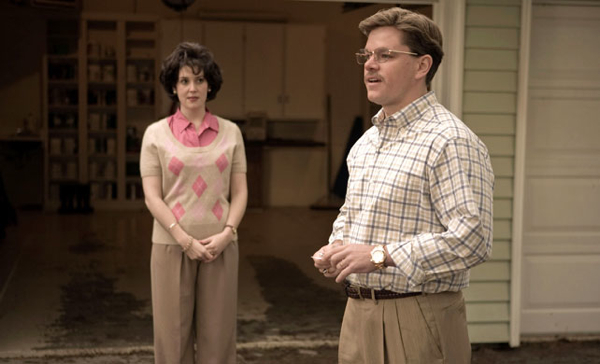Movie review by Greg Carlson
Like the Coen Brothers, director Steven Soderbergh has been accused of making movies that discount, ignore, or purposefully flummox viewers in favor of the creator’s own personal amusement. “The Informant!” is not as absurdly funny as the products of Joel and Ethan’s worldview, but Soderbergh makes mincemeat of Kurt Eichenwald’s book about Mark Whitacre, a prevaricating whistleblower whose own crimes were temporarily papered over when he began spying on his employer, Archer Daniels Midland, for the FBI. With its sizable supporting cast of comics (including cameos by the Smothers Brothers) and a jokey score by Marvin Hamlisch, “The Informant!” warns viewers that they will not be seeing a “true story.”
Matt Damon plays Whitacre as a deluded fabulist who rationalizes a bizarre string of bigger and bigger fibs to avoid being caught for his own indiscretions. With a bulked-up frame, ridiculous hairpiece, and nerdy spectacles, Damon physically distances himself from his typical screen persona. The audience might at first be inclined to like Damon’s Whitacre, who eagerly embraces his opportunity to role-play as a spy for federal agents, but Soderbergh and screenwriter Scott Z. Burns are quick to exploit the man’s deep flaws. As a result, Whitacre grows less and less sympathetic as the information he provides to his contacts fails to check out.
Whitacre’s foibles are punctuated by interior monologues that betray his mental state through stream of consciousness ruminations on topics ranging from designer neckties to Japanese businessmen who purchase used panties. The voiceover thoughts pop up whenever Whitacre should be focusing his attention on keeping straight his web of lies. Sounding like Jack Handey’s “Deep Thoughts,” the non sequitur surrealisms in Whitacre’s head add another layer of incredulity to the upside down world constructed out of the man’s fraudulent layers of deceit.
Even though “The Informant!” is set in a corporate culture populated almost entirely by men, the movie’s greatest deficiency is the lack of interest taken in Whitacre’s loyal wife Ginger (Melanie Lynskey). The movie’s narrative resolutely follows a linear unraveling of Whitacre’s mountain of myths, and when the story includes Ginger, she unwaveringly stands by her mate. With the exception of a late scene that provides small insight into Ginger’s fatigue with the lengthy ordeal, we never know the extent to which she believes her husband’s stories. Lynskey, however, is a skillful actor, and manages to energize an underwritten role.
Soderbergh, who shot “The Informant!” under his usual alias Peter Andrews, frames the drab corporate settings with a wickedly cruel sense of desolation. The bad suits, ghoulish coiffures, and shiny sports cars mock Whitacre’s desperation to cast himself as the Tom Cruise version of the protagonist in John Grisham’s “The Firm,” a good guy surrounded by bad guys intent on doing him harm. This detail is one of Sodergbergh’s many reminders that feature films “based on real events” are constructed as fiction no matter how much we would like to believe otherwise. The “so there” that Soderbergh attaches to the text that opens the movie impishly insults the self-applied seriousness that accompanies so many screen adaptations touting journalistic factualism.
